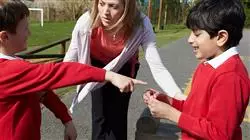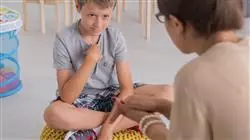University certificate
The world's largest faculty of psychology”
Why study at TECH?
Acquire the personal and professional tools necessary to intervene in conflict situations helping the classroom to thrive and grow emotionally and personally"

This program offers a comprehensive view of conflict resolution in the classroom, as well as successful models of approach, providing tools, experiences and advances in this field, which have also been guaranteed by the faculty of the course, as all of them work in this field. Each psychologist will learn, based on professional experience, as well as evidence-based pedagogy, which makes the student's training more effective and accurate.
The skills that a mediator possesses are the same that the psychologist can cultivate, serving as a mediator between the patient and the learning process; their intention would be to encourage and facilitate this process so that the child or adolescent reaches their goal.
Mediation in the socio-educational system is emerging and capable of strengthening both in families and students a positive point of improvement so that the result is to allow both educational and human learning of the relationships that are established in this environment.
The perspective from the emerging psychological paradigm must be inclusive and must be based on a biopsychosocial model that contemplates attention to diversity from a comprehensive approach aimed at the entire educational community.
Psychologists, from the different educational stages, as well as related professions both in the educational and socio-health fields, need to know the characteristics of these students in order to identify their needs and have the knowledge and tools to intervene at a personal, socio-familial and, above all, educational level.
This program responds to this situation by providing the professional with the most up to date skills in classroom conflict management and attention to diversity in psychosocial contexts. Therefore, it will be able to adjust the plans of attention to diversity and the educational projects of the centers, as well as being able to design a mediation plan in various fields.
A contextualized and real educational program that will allow you to put your learning into practice through new skills"
This Postgraduate diploma in Classroom Manipulation, Roles and Conflicts contains the most complete and up-to-date educational program on the market. The most important features include:
- The development of different practical cases presented by experts in classroom mediation and conflict detection
- The graphic, schematic, and practical contents provide students with scientific and practical information on the disciplines that are essential for professional practice
- New developments in mediation and conflict detection in the consulting room
- Its practical exercises where to perform the self-assessment process to improve learning
- Special emphasis on innovative methodologies in mediation and conflict detection in the consulting room
- Theoretical lessons, questions to the expert, debate forums on controversial topics, and individual reflection assignments
- Content that is accessible from any fixed or portable device with an internet connection
A practical, real-world program that will give you the tools you need to help your patients and their families move forward from conflict in a positive and enriching way"
Our teaching staff is made up of working professionals. In this way we ensure that we deliver the educational update we are aiming for. A multidisciplinary team of professors trained and experienced in different environments, who will develop the theoretical knowledge in an efficient manner, but, above all, will put at the service of the program the practical knowledge derived from their own experience: one of the differential qualities of this training.
This mastery of the subject is complemented by the effectiveness of the methodological design of this Postgraduate diploma. Developed by a multidisciplinary team of e-Learning experts, it integrates the latest advances in educational technology. This way, you will be able to study with a range of comfortable and versatile multimedia tools that will give you the operability you need in your training.
The design of this program is based on Problem-Based Learning: an approach that views learning as a highly practical process. To achieve this remotely, we will use telepractice learning: with the help of an innovative interactive video system, and learning from an expert, you will be able to acquire the knowledge as if you were actually dealing with the scenario you are learning about. A concept that will allow you to integrate and fix learning in a more realistic and permanent way.
This program comes with the best educational material, providing you with a contextual approach that will facilitate your learning"

This 100% online Postgraduate diploma will allow you to balance your studies with your professional work while expanding your knowledge in this field"
Syllabus
The contents of this training have been developed on the basis of two main objectives: on the one hand, their timeliness and effectiveness, and on the other hand, the students' ability to integrate their learning quickly and efficiently. This combination allows students to learn in a progressive and constant way, evolving from the first moment to the highest level of competence in this area of work.

A high level educational program that will allow you to apply new concepts and strategies from the very first moment thanks to its practical and contextual approach"
Module 1. Validate Emotions and Discover Basic Emotions
1.1. How do People Establish Contact?
1.1.1. The Environment
1.1.2. Contact Zone
1.1.3. The Body
1.1.4. Basic Needs
1.1.5. I Choose
1.1.6. I Build
1.2. How to Acquire a Validating Style
1.2.1. Being Curious about the Details Given by Another Person
1.2.2. Being Curious about the Details Given by My Body
1.2.3. Extrinsic Emotional Attention: How did that Make you Feel?
1.2.4. Intrinsic Emotional Attention: What does What you are Telling me Sound Like?
1.3. How do I Recognize my Basic Needs?
1.3.1. Identifying my Childhood Wound
1.3.2. How can I Become Aware of my Fears?
1.3.3. How can I Empathize with Someone Else’s Fears?
1.4. Honesty in my Response
1.4.1. The Shell: Responses that Prioritize Self-Protection
1.4.2. The Shell: Responses that Prioritize Adapting to Surroundings
1.4.3. The Anchor: Reality-Focused Responses
1.4.4. The Cloud: Possibility-Focused Responses
1.5. The World of Emotions
1.5.1. Emotions in the World
1.5.2. Galaxies and Constellations of Emotions
1.5.3. The Galaxy of Fear
1.5.4. The Galaxy of Rage
1.5.5. The Galaxy of Sadness
1.5.6. The Galaxy of Joy
1.5.7. The Galaxy of Surprise
1.5.8. The Galaxy of Affinity
1.5.9. The Galaxy of Disgust
1.6. Analysis Sheets for the Recognition of Basic Needs
1.6.1. Types of Worksheets
1.7. Online Resources on Basic Needs and Emotions
1.7.1. Online Resources on Needs
1.7.2. Online Resources on Basic Emotions
Module 2. Power Struggles Are a Maze
2.1. We All Manipulate
2.1.1. The Importance of Self-Esteem
2.1.2. Defending our Living Space
2.1.3. Emotional Manipulation
2.2. The Roles in the Power Struggle
2.2.1. The Oppressor
2.2.1.1. Aggression. The Manipulator's Weapon
2.2.1.2. Aggression Models
2.2.1.3. Moral Harassment
2.2.1.4. Governing Through Aggression
2.2.2. The Victim
2.2.2.1. Crying as a Form of Manipulation
2.2.2.2. Governing Through Victimhood
2.2.3. The Caregiver
2.2.3.1. Misunderstood Gratitude
2.2.3.2. Governing through the Caregiver
2.3. The Power
2.3.1. The Need for Power Soils
2.3.2. Honest Search for Solutions
2.3.3. Searching for the Basic Need Underlying a Conflict
2.3.4. How to Ask Questions to Get out of a Power Struggle
2.4. Focus the Search on What I Can Do
2.4.1. Neither Power Struggle, Nor the Environment, Nor the Other Is to Blame
2.4.2. How to Discover What I Can Do
2.5. Manipulation at the Service of the Mediator
2.5.1. Manipulation, Just Another Technique
2.5.2. Role-Playing in the Power Struggle Game
2.5.3. Negotiation Techniques
2.6. Creating a New Identity
2.6.1. How to Save Aggressors from Themselves
2.6.2. How to Save Victims from Themselves
2.6.3. How to Save Caregivers from Themselves
Module 3. Conflict Phases
3.1. Disagreement
3.1.1. Beginning of the Conflict, Possible Causes
3.1.2. The Problem Concerns Both
3.1.3. Conflict Comes First
3.2. Personal Adversity
3.2.1. Blame and Reasons
3.2.2. People Come First
3.3. Mediation between Both Sides
3.3.1. Rights within a Dispute
3.3.2. Responsibilities within a Dispute
3.4. The Background, Just the Tip of the Iceberg
3.4.1. External Agents
3.4.2. Attitude toward External Agents
3.4.3. What is Really Happening Here?
3.5. What Can Each Party Do?
3.5.1. Proposed Solutions
3.5.2. Strengths, Threats, Weaknesses and Opportunities
3.6. New Developments in Each Party's View
3.6.1. Putting Oneself in the Other’s Shoes
3.6.2. Lateral Thinking
3.6.3. Thinking Patterns
3.7. Fitting in New Proposals
3.7.1. Feelings About Proposals
3.7.2. Strategies to Fit Them In
3.8. Ending the Conflict
3.8.1. What Does Ending a Conflict Involve?
3.8.2. Why Ending Conflicts is Important
3.9. Restoring Pain
3.9.1. How to Restore Pain
3.10. Erase Prejudices, Continue to Build
3.10.1. How to Erase Prejudices
Module 4. Roles in Conflict Resolution
4.1. What is a Group?
4.1.1. What is a Group?
4.1.2. Characteristics of a Group
4.1.3. Students Group Together. How to Recognize Them
4.2. Group Dynamics
4.2.1. What Are the Techniques and Activities for?
4.2.2. What are the Core Competencies for Working with Drama?
4.2.3. Group Dynamics Techniques
4.3. Role Types in Conflicts
4.3.1. Classification: Mediating Chicks
4.3.2. Role Play Technique
4.4. How to Identify Roles in Students
4.4.1. Techniques to Identify the Different Roles
4.5. Shifting Roles: Context
4.5.1. The Johari Window at the Service of Roles
4.5.2. The Role Others Identify Me As. What Others See and I Don't
4.5.3. The Role I’d Like to Have and How to Get It
4.6. The Teacher’s Role According to Their Participation
4.6.1. Activities in Which the Educator's Role Predominates
4.6.2. Activities Involving Educator and Students
4.6.3. Activities According to the Group’s Objectives
4.7. Dramatic Play: Role-Training in Conflict Resolution
4.7.1. How to Conduct Dramatic Play as Conflict Resolution Training
4.8. Drama: Integrating Core Competencies for Life
4.8.1. Play or Therapy?
4.8.2. Role-Playing Conflict in the Classroom
4.9. Sense of Humor in Role Management
4.9.1. Having a Sense of Humor in Role Management
4.10. Theater of the Oppressed as a Tool for Reflection in the Face of Conflict
4.10.1. Theater of the Oppressed
4.10.2. Using this Tool in the Face of Conflict

A unique, key and decisive training experience to boost your professional development”
Postgraduate Diploma in Manipulation, Roles and Conflict in the Classroom
Manipulation, roles and conflicts are three key elements that influence classroom dynamics and can have a significant impact on the quality of education. For this reason, it is important that school psychologists have effective tools to manage these situations and promote an environment conducive to learning. The main objective of this Postgraduate Certificate in Manipulation, Roles and Conflicts in the Classroom is to provide you with the most updated strategies for intervention in contexts where there are behavioral problems. All this, through the most complete didactic contents available in a wide number of didactic formats of textual and multimedia character.
Combine your excellent learning with your professional obligations.
The Postgraduate Diploma in Manipulation, Roles and Conflicts in the Classroom is an excellent option to develop your career as a psychologist in the educational field. Throughout this academic experience, you will determine the existing phases of conflict between students, you will acquire the cutting-edge techniques to successfully mediate them or you will use games as a mechanism to solve disputes. In addition, you will have a 100% online methodology that will allow you to study without having to make uncomfortable trips to a study center.







